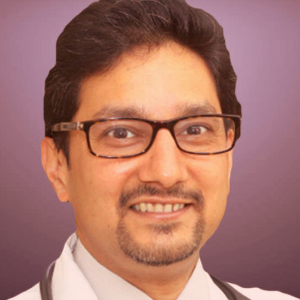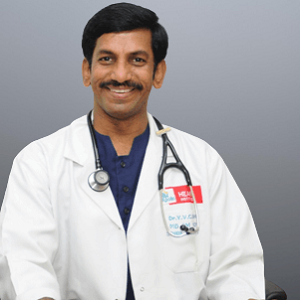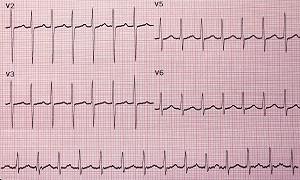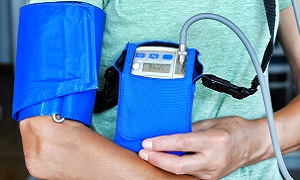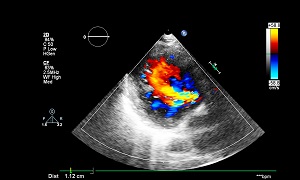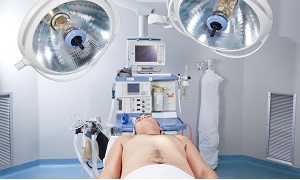Best Permanent Pacemaker Implantation Doctors in India
- Interventional Cardiologist, New Delhi, India
- Over 20 years’ experience
Profile Highlights:
- Dr. Vishal Rastogi is a leading Interventional Cardiologist in Delhi specializing in Heart Failure Management.
- Dr. Vishal Rastogi has over 20 years of experience in the field and holds the credit for the largest number of Impella Left Ventricular Assist Device (LVAD) implants in critically ill patients in India.
- He has performed a large number of Coronary and Peripheral Angiographies and diagnostic cardiac catheterizations in both adult and pediatric patients among several other interventional cardiac procedures.
- Interventional Cardiologist, Chennai, India
- Over 25 years’ experience
Profile Highlights:
- Dr. Y Vijayachandra Reddy is an interventional cardiologist with 25+ years of experience.
- Dr. Reddy’s work experience includes more than 7000 PCIs, 30000 invasive procedures, 550 PCIs in cardiogenic shock, 700 Cardiac devices, 400 PTMCs, and several EVAR and TEVAR procedures.
- His expertise lies in pacemaker implantations, pediatric interventions, ICDs, CRTs, endovascular repairs, and more.
Best Pacemaker Implantation Hospitals in India
Lilavati Hospital & Research Centre, Mumbai
- City: Mumbai, India
Hospital Highlights:
- Lilavati Hospital & Research Centre is India’s premier multi-speciality tertiary care hospital and has been recognised as a global medical excellence centre.
- Lilavati Hospital & Research Centre has built an unrivalled level of trust with its patients over the years, thanks to a solid foundation that comprises cutting-edge facilities, the best medical competence, research, education, and charity endeavours.
- The hospital is quite proud of the fact that it now serves patients from all kinds of backgrounds, not just from the United States but from all around the world.
- The hospital has a total of 323 beds, one of the largest Intensive Care Units (ICUs), 12 Operation Theatres with modern amenities, over 300 consultants, and almost 1,800 personnel.
Venkateshwar Hospital, Dwarka, New Delhi
- City: New Delhi, India
Hospital Highlights:
- State-of-the-art technology and devoted healthcare professionals have been brought together under one roof at Venkateshwar Hospital to provide genuine medical care. The hospital’s professionals work together as a team to deliver the best possible treatment to their patients, using the most sophisticated equipment and information technology.
- Venkateshwar Hospital’s mission is to attain global excellence in healthcare by employing evidence-based, ethical clinical practices and cutting-edge technology by a team of highly skilled experts.
Marengo Asia Hospital, Faridabad
- City: Faridabad
Hospital Highlights:
In the sprawling city of Faridabad, where healthcare needs are diverse and ever-evolving, one institution has consistently stood out as a beacon of excellence in the field of medicine—Marengo Asia Hospital. Established with a vision to provide world-class healthcare services to the community it serves, Marengo Asia Hospital has emerged as a trusted name synonymous with quality, compassion, and innovation in healthcare.
Pacemaker Implantation
Pacemaker is a small device that is implanted under the skin in the chest which monitors the heartbeat & controls the heart rhythm.
A pacemaker has two parts:
1. The pulse generator- This is small metal container that houses the battery & the electrical circuit that regulates the rate of electrical pulses sent to the heart.
2. Electrodes or leads- They are insulated wires placed in the heart chambers which delivers electrical pulses to adjust the heart rate.
Types of Pacemakers
There are three types of Pacemakers:
- Single Chamber Pacemaker- They carry electrical impulses from the generator to the right ventricle of the heart.
- Dual Chamber Pacemaker- They carry electrical impulses from the generator to the right atrium & right ventricle, both.
- Biventricular Pacemaker- They simulate the right & left ventricles both, so that the heart beats more efficiently. It is a treatment option for people suffering from heart failure.
Indications for Pacemaker
Pacemakers are used to treat the following:
- Cardiomyopathy
- Heart failure
- Slow heart rhythms also known as bradyarrythmia.
- Syncope
Tests done before Pacemaker Implantation
Electrocardiogram
Holter Monitoring
Echocardiogram
Stress Test
Pacemaker Implantation procedure
Before the procedure
- Do not eat or drink anything after midnight the evening before the procedure.
- Stop taking certain medications like diabetes 1 to 5 days before the procedure.
During the procedure
Pacemakers are implanted in 2 ways:
- Endocardial approach- This approach is commonly used for pacemaker implantation. In this approach, local anaesthesia is administered to numb the area where an incision is made. Through an incision the lead is inserted into a vein, then advanced to the heart with the help of the x-ray machine. One end of the lead is attached to the heart muscle, while the other end of the lead is attached to the pulse generator, which is placed in a pocket created under the skin in the upper chest.
- Epicardial approach- This approach is commonly used in children. In this approach, general anaesthesia is administered. One end of the lead is attached to the heart muscle, while the other end of the lead is attached to the pulse generator, which is placed in a pocket created under the skin in the abdomen.
After the procedure
Special precautions
- Avoid placing the cell phone directly over the pacemaker implantation site when the phone is turned on.
- Avoid leaning against a metal-detection system.
- If a doctor is considering any medical procedure that involves intensive exposure to electromagnetic energy like magnetic resonance imaging, therapeutic radiation for cancer treatment, tell him /her about the pacemaker implanted.
- Stand at least 2 feet from welding equipment, high-voltage transformers or motor-generator systems.
FAQs
1. What is the recovery time for a pacemaker surgery?
The recovery time for a pacemaker surgery is 3-4 weeks.
2. Do cell phones interfere with pacemakers?
It is safe to use a mobile phone, but make sure it is kept at a distance of more than 6 inches from the pacemaker.
3. For how long do the pacemaker batteries last?
Most pacemaker batteries last for 6 to 10 years.
4. How often will the patient need follow-up appointments?
- The follow- up appointments may be every 3 to 12 months, depending on the type of pacemaker you have and how well it works

